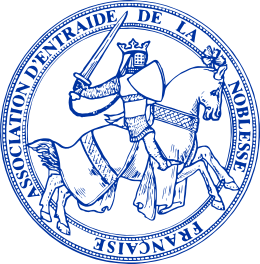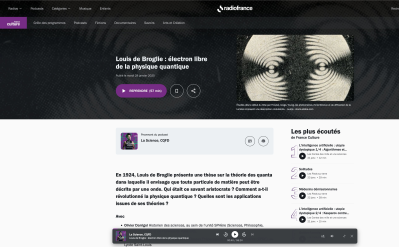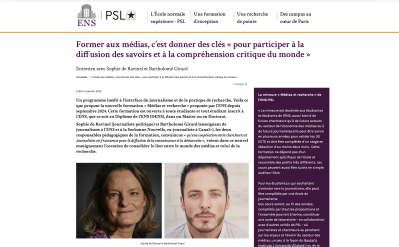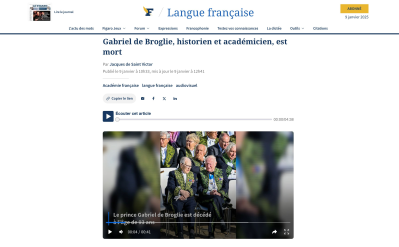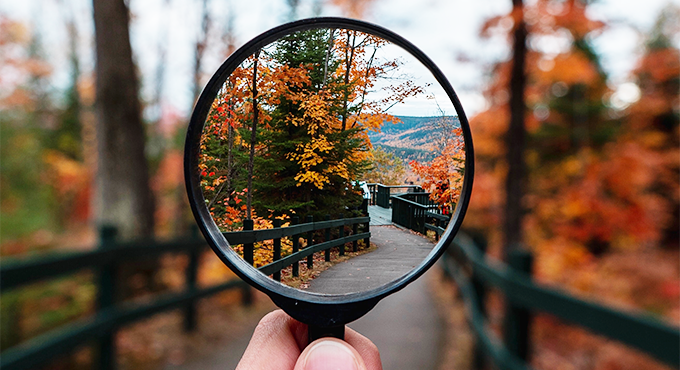News

Le Figaro: "The success of these new influencers who make people love France: "There is a dynamic of re-rooting""
ENQUÊTE : They're not just for the young, they share a French epicurean spirit, and they're exploding on the social networking sites. Followed by hundreds of thousands of Internet users, they proclaim their love for France.
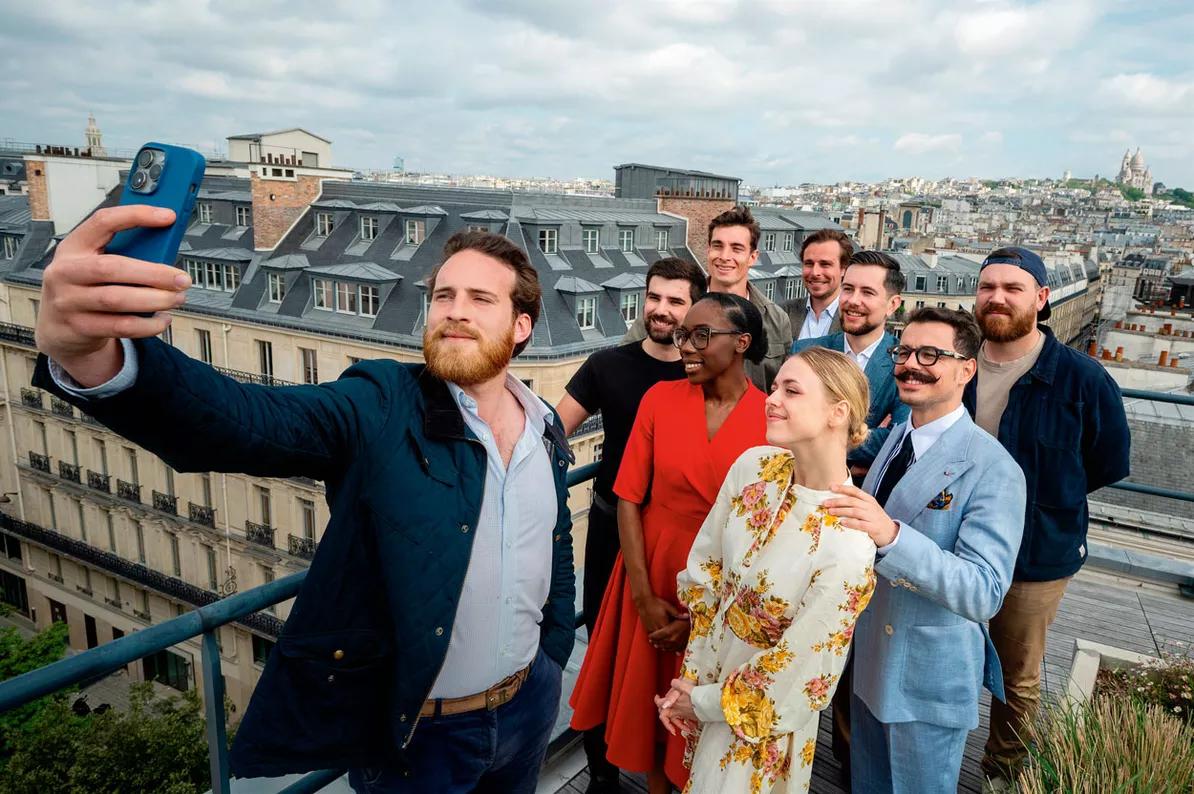
These new influencers, in love with France, gathered on the terrace of Le Figaro, Paris. Olivier Coret for Le Figaro Magazine
" We're celebrating France !" With a jug of red wine in his hand and a slice of ham on the end of his fork, Guillaume is delighted. Here, we don't eat lunch, we celebrate. You don't sit at a table, you sit at a banquet. Over 300 people have gathered in this old Beaujolais mansion. "Breathalyzers are available free of charge. At the microphone, Pierre-Alexandre de Boisse, one of the two friends behind the concept, warns. But in the room, his voice is already drowned out by the joyous hubbub of shouts and chants from the guests who have rushed to purchase the first bottle served, a Morgon.
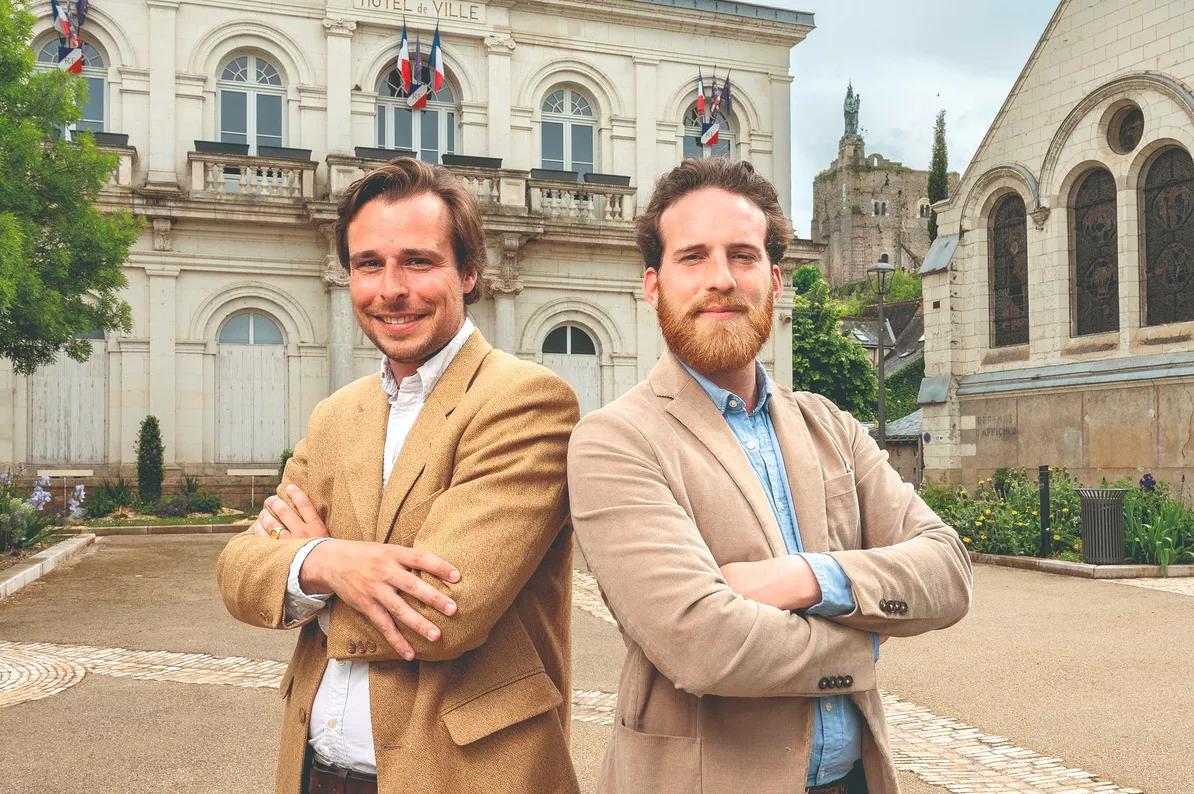
Géraud de la Tour and Pierre-Alexandre de Boisse, Le Canon Français. "We don't want to become an annex of a political party. Tomorrow, if the President of the Republic comes to the banquet, he'll be seated with everyone else. With us, the notable sits with the worker." Olivier Coret for Le Figaro Magazine
French canon feasts
"We're giving a warm welcome to journalists today," also alerts the organizer, raising his voice to cover the few cheers and many boos that respond. " You, Le Figaro, it's okay, we like you", reassures a table neighbor, Yannis, a "local guy" from Cluny. "Where there's a big castle ?" questions one across the table. " These are the remains of the largest church in Europe", says our neighbor, forgiving the equivocation. Around these huge tables, and despite the fanfare and the clatter of bowls, everyone is talking and meeting each other.
Le Canon Français organizes such events twice a month throughout France. In just one year, the concept has exploded. Since their appearance on social networks, images of large-scale feasts have been doing the rounds of the platforms. According to the two friends, the waiting lists for their event are now longer than the number of registrants. Their Instagram account is approaching the 200,000-subscriber mark. And it's no longer the only one.
In just a few years, several accounts of this type have flooded social networks. Their creators talk about gastronomy, fashion, travel, the art of living or architectural treasures. All have one thing in common: they celebrate French heritage and terroir, paradoxically seizing on platforms that traditionally advocate globalization. With notable success in recent months: most have reached the 100,000, 200,000 or even 300,000 mark.
Using short videos ("reels" on Instagram, "TikTok" on the eponymous network) and stories (ephemeral 24-hour videos), these new-style influencers aim to restore a taste for heritage. The themes are varied, but the profiles of subscribers are similar: most are men (70 to 80% depending on the account), aged 25 to 35 (45% on average) and 18 to 24 (25% on average).
"Young people want to know about the history of the church next door to them," whispers Simon Vasseur, or "Simon de la Garde du Patrimoine", who showcases the beauty of French architecture mainly on Instagram. Perched on an interior balcony of the Madeleine church in Paris, we watch him make a short video. "I'm going to film myself in front of the mosaic, it's hard to embody content in such large monuments, but subscribers like it." Christ in Majesty is depicted, crossed by a large crack. Above, the large fresco in the dome celebrates the intertwined history of France and Christianity," explains Simon.
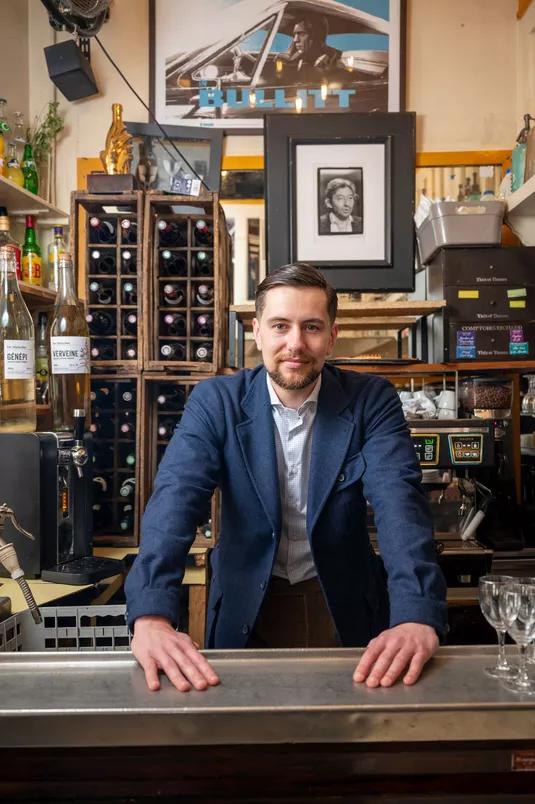
Yoann Collot, Dose de France. "There's a patriotic side to my content. I'm not going to advertise for other countries. I'm French and I'm not ashamed." Olivier Coret for Le Figaro Magazine
Putting down roots
His account really took off last November, growing from 50,000 subscribers to over 200,000 today. The young man regularly posts polished videos of French cathedrals and castles. "There's a dynamic of re-rootedness," he says, explaining the phenomenon, which resonated when young people finally understood that, on Instagram, "alongside the bling culture of classic influencers, Paris is as cool as Dubai and Aveyron as Miami".
Yoann Collot approves of the gentian liqueur he obtains from a formula dusted off in his great-grandfather's attic. " People are sometimes totally at odds with their terroir and its traditions, and wonder who they are and where they come from", he analyzes. The man who calls himself "Dose de France" on the networks grew up in the Paris suburbs before taking a closer look at his origins in Correze.
"My great-grandfather was a peasant, as was his father before him, and it goes all the way back to 1600, when my grandfather was a 'bell ringer'",according to one record. The 170,000-subscriber influencer illustrates this need for roots in his content, where he brings old spirits recipes up to date with astonishing success, and praises the riches of French gastronomy with a dose of humor, promoting fine dining.
None of the content creators we met, all in their thirties, want to get stuck in the past, refusing to be nostalgic for eras they haven't experienced. " The aim is not to bring something old up to date, but to prove that it still has a place today," sum up the two companions from Canon Français.
Alexandre Czech, aka "Bonne Pitance" on the networks, agrees: "I'm a big geek, very connected, and I think we're living in one of the best periods in human history. It wasn't 'better before', as they say, but there were exceptional things before that we need to preserve."
This former IT manager turned butcher welcomes us on the outskirts of Le Mans. We've come on the wrong day: he, the inveterate meat-eater, is letting us taste his latest recipe... vegetarian. A generous onion tart nonetheless. Since April 2023, Alexandre has joined the long cohort of "food influencers" on social networks. But he sets himself apart from the plethora of content of this type by bringing a more authentic, terroir-oriented touch.
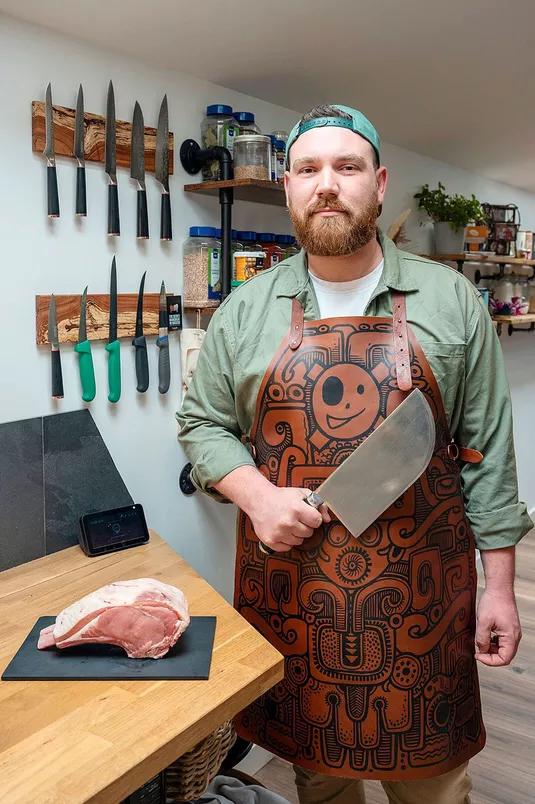
Alexandre Czech, Bonne Pitance. "I have a cap and a squatter's look, because you don't have to wear a beret and mustache to show you love France." Olivier Coret for Figaro Magazine
A concern for elegance
Alexandre particularly enjoys reproducing the old recipes of our regions, "which symbolize our heritage": tripe à la mode de Caen, beuchelle à la tourangelle, kig ha farz breton, trompe-goule sarthois... Paradoxically, these forgotten dishes, now found only in books or INA videos, have met with great success among the younger generation, usually put off by this peasant gastronomy often composed of less "noble" foods.
Some of his videos have reached the million-view mark, and his account has accumulated over 220,000 subscribers in just one year. " It reminds people of their grandparents' cooking," Alexandre explains. The same motivation motivates the participants in the Canon Français banquets: "Many of our guests come to experience the festivities of their grandparents," explains Pierre-Alexandre from Canon Français, for example.
On a more general note, most of the influencers we met summon up the past as a solution to society's malaise.
"We're witnessing an existential crisis in the human race, prompting us to question our appearance, our need for better housing, better food and better clothing. And yet, in times of crisis, we need certainties, which we find in History," theorizes Emmanuel Paraschiv-Debussy.
We meet the 32-year-old at the chic Café des Tuileries in Paris. Proudly sporting a mustache and wearing a navy-blue three-piece suit, "Emmanuel PCR", as he calls himself, passionately discusses how politicians dress. "The one who wore impeccable suits was François Fillon. He didn't smile," he explains. Three times a week, Emmanuel posts videos on his social networks entitled "On s'habille ensemble", in which he suggests an elegant outfit to his users. His content aims to rehabilitate good taste in clothing and sustainable materials, whether French or European.
His motto? "Fashion is fleeting, elegance is timeless." For the young man with 325,000 followers on Instagram and over 600,000 on TikTok, "suits have this ability to give people confidence". He criticizes the "comfort at any price" that is leading to the "standardization" of society, and also to the disappearance of certain traditional trades, such as chippers and shoe formers. " Elegance allows craftsmen and their families to make a living," he insists. He too looks to past generations for inspiration, with a hint of regret: "Our grandparents didn't throw things away, they repaired them. Beautiful materials were passed down from father to son. His subscribers follow the same reasoning. Discussions with them show that "the desire to dress better often stems from reappropriating a personal history, or even the history of France".
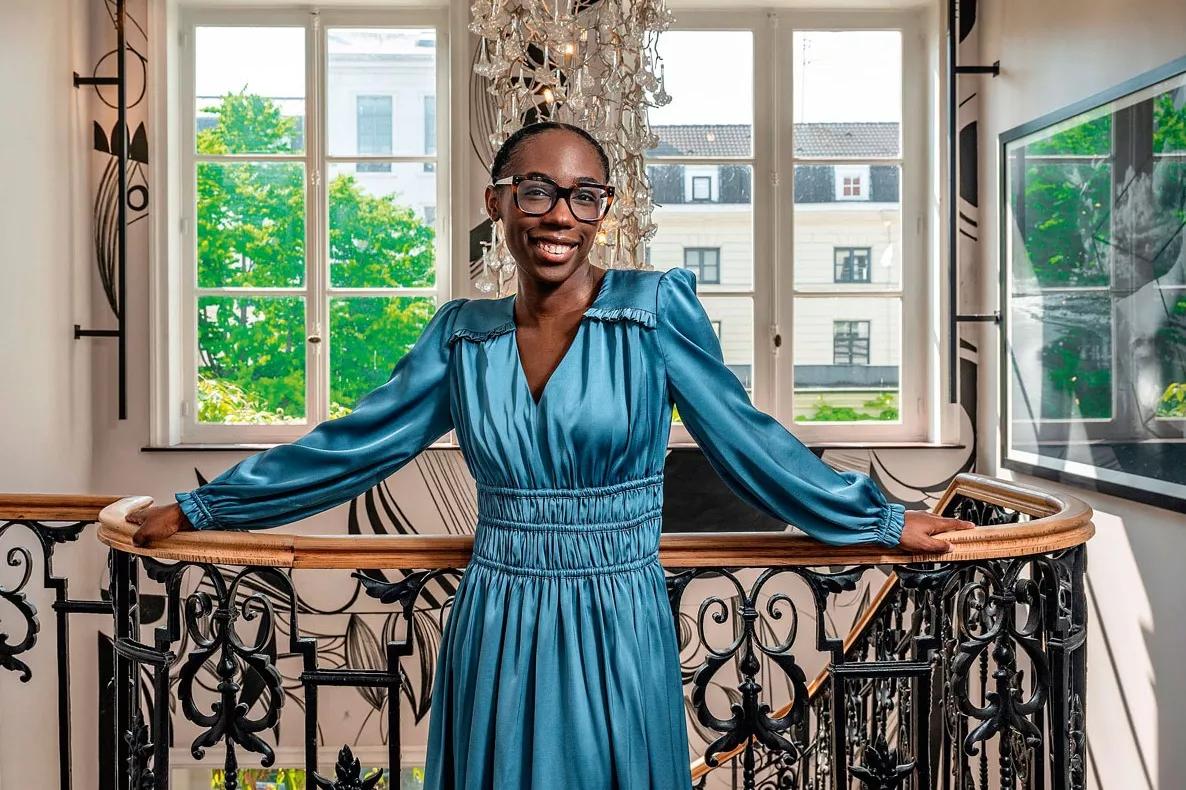
Carmel Assak, Splendide Élégance. "I've sometimes been accused of saying that the rules of good manners are incompatible with feminism. When we talk about gallantry, it can be a problem. But, like courtesy, it's simply benevolence." Olivier Coret for Le Figaro Magazine
Covid and new mores
Is it necessary to steep oneself in history in order to live better in society? Carmel Assak, who has 276,000 followers on Instagram, also defends sartorial elegance on her social networks, but also good manners and the French art of living. Society today isn't very harmonious, because we've lost the natural use of good manners, which used to have a good side," she says. For many, good manners applied a hundred years ago. But we can't put that in the past, it has to continue to exist."
With their different temperaments, backgrounds and passions, these influencers in love with France have one thing in common: they've all hit the big time in the space of just a few months. Most now make their living almost exclusively from social networking, thanks in no small part to paid partnerships with brands or companies. The economic spin-offs are fluctuating, sometimes comfortable but never staggering. Heritage influencers choose their sponsors very carefully, so as not to distort their message. Alexandre, for example, continues to work as a butcher two days a week, and will shortly be publishing a cookery book. Emmanuel still has a small communications business and Carmel is studying international business law.
Why are they such a success now? Obviously, Covid has played its part. Imprisoned youth, constrained by closed borders and sometimes diminished purchasing power, naturally turned to simpler activities and less distant destinations. "People started cooking at home again, and at the same time, they needed to get together," also explains Géraud, from Canon Français, who claims that after successive confinements, demand grew exponentially while supply was not yet there. "Today, there are accounts like ours, with our concept, being created every day in the regions."
"Maybe after the presidential election of 2022, a lot of people got fed up with the overflow of politics," Yoann reflects aloud, claiming that many subscribers have told him they want to find fulfillment in more concrete activities, not hesitating to speak of a search for identity. For if Covid has been a revelation, the phenomenon is more, for those who observe it closely, the symptom of an era.

Antoine de Suremain, Antoine explores France. "Natural heritage has determined French culture. People's behavior is influenced by the regions in which they live. If we don't take care of French culture and identity, we risk losing it." Olivier Coret for Le Figaro Magazine
A taste for heritage
"We're living in a period devoid of meaning, and we need to rediscover unifying values," explains Antoine de Suremain, aka "Antoine Explores France". At the age of 31, this video artist and adventurer travels the length and breadth of France, filming his journeys through the Cantal "jungle" or the heart of the Provencal "wild west", down the Loire or across the Alps, and even into the catacombs of Paris. Antoine shares his adventures on social networks, and has also produced a TV show on Canal+. Today, he dreams of becoming Stéphane Bern of France's natural heritage. " And not of the environment, because landscapes are the common base of all other heritages: they have partly determined French culture" , he explains, evoking the example of the Camargue salt marshes that gave birth to the bullfighting and manadière culture.
The adventurer also regrets that"loving France is associated with the right". In his view, "it's a mistake to turn it into something political". A former scout who doesn't hesitate to talk about his Christian faith, Antoine insists on reaching out to all audiences. Alexandre also dismisses the "extreme right-wing" argument.
"A lot of people want to go back to French values because they're afraid of the Great Replacement. I'm not doing that because I feel that kebabs are replacing bistros", he assures us.
While all the influencers we met are keen to stay away from politics, some have a sociology that doesn't give them away. " When I pass someone in a Barbour jacket and a signet ring on the street, chances are they'll stare at me... and recognize me," says Yoann, who points out that his community is now very diverse. I'm a white man with a moustache and a tricolor flag in my lapel, and that inevitably triggers comments," smiles Emmanuel. But I don't stop there. French elegance shouldn't be partisan. Jean Jaurès was very elegant, and Marx's lapels were wider than mine (a sign of elegance, editor's note) !
In the same vein, Carmel Assak laments the fact that she is sometimes referred to in the comments of her publications as a "droitarde". "Elegance is often associated with the bourgeoisie, and therefore with the right-wing: that's because it's thought that to be elegant is to have money. But that's not true: there are second-hand, low-cost items. It's unfortunate to link this to a political current.
Emmanuel's sister, Céline Debussy, who launched a similar account focusing on feminine elegance, confirms the apolitical nature of their approach. "The only thing I'm political about on my page is learning to consume French because our heritage is so rich, with all its industries, old houses, local know-how." The self-professed 100% Parisian opened a TikTok account two years ago. Today, she works "as a family" with her brother, multiplying the videos together, playing on their complicity.
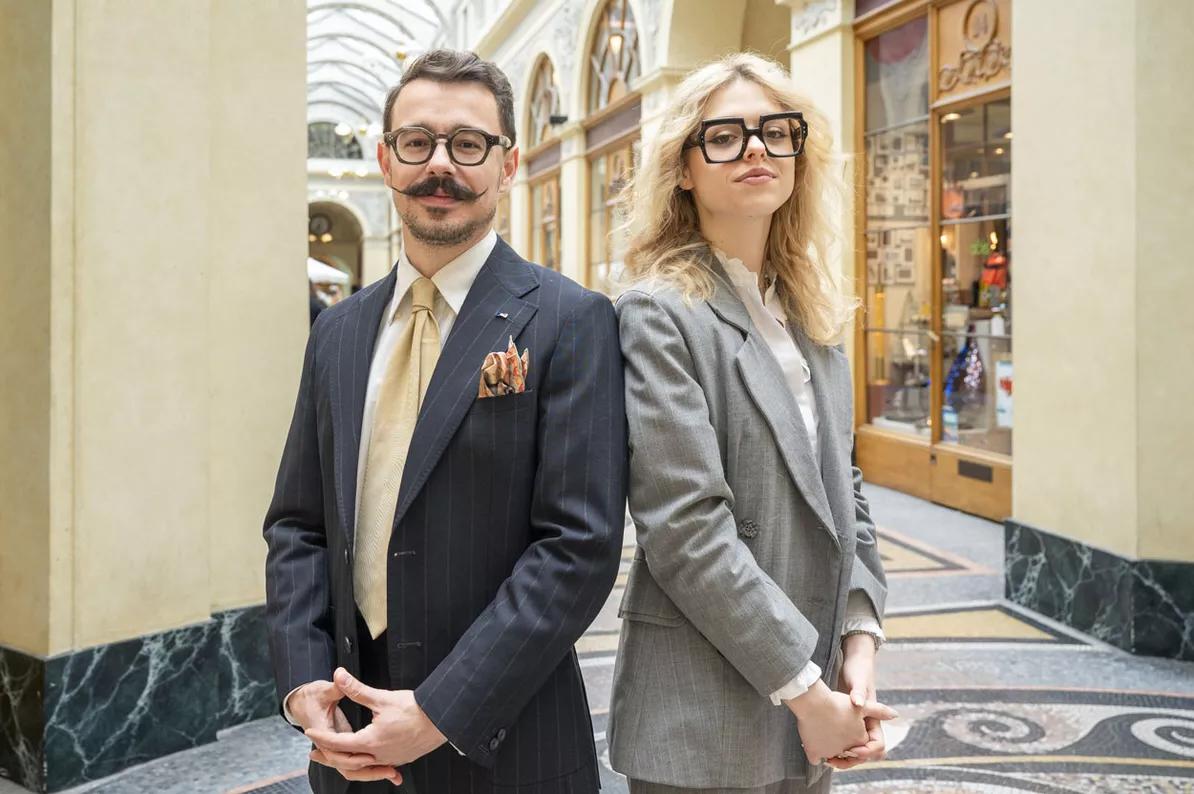
Emmanuel Paraschiv-Debussy and Céline Debussy, Élégance Masculine/Féminine. "I'm not doing all this to go to Dubai. The aim is not to influence, but to pass on what I feel is right, both in terms of portfolio and quality. My mission? "Make elegance great again! Olivier Coret for Le Figaro Magazine
French pride
Like Carmel, Céline is a proponent of "slow fashion", as opposed to "fast fashion", which is all about buying quickly and in quantity, and claims French elegance as "a way of being, a way of life", not a political marker. "There's a real demand for authenticity in a world where there's a lot of reality TV," she explains simply, betting on a "French pride" shared by all.
"We're very keen to keep banquets open, so that everyone can come along," say the two friends from Canon Français. Their large-scale feasts bring together a fairly varied population, albeit not very urban and close to the outskirts. In the Beaujolais region, to their dismay, a drunken group sang "On est chez nous" ("We're home ") right from the start . The two friends want to resist the politicization of their "franchouillard" events, where a certain France is celebrated.
At a time when France is more politically divided than ever, "love of country must be depoliticized and unifying," insists Antoine de Suremain. I fell in love with France as a person, and I love her with all her qualities and faults. The stated aim of his account is to "reconnect the French with their country". Emmanuel agrees: "The French should listen less to what's going on elsewhere and refocus on themselves. I have the impression that we have lost, or not yet found, the answer to what it means to be French."
Some don't distance themselves from the increasingly connotative concept of "patriotism". " I'm not going to pretend: there's a patriotic side to my content," says Yoann. Because, in his opinion, in France today, "we're raising a lot more American kids than French ones." Others fully embrace the use of social networks as a tool of influence. " I promote the 'soft power' of French culture to the French," says Simon Vasseur.
All are aware of the more or less conscious role of influence they play on social networks. But they don't accept the overused term "influencers". "Influencers are a kind of pass-through between brands that aren't worth much and subscribers who are voyeurs," agrees Emmanuel. He prefers the term " content creators".
Nevertheless, several of his subscribers have invested in a more stylish wardrobe since following his account. Two of Antoine's subscribers, who are used to traveling around the world, took his advice to travel through the Jura mountains for several days. And the 5-year-old son of two other subscribers asked for a compass for his birthday, "to do like Antoine". Alexandre has also encouraged several of his followers to get back into the kitchen, including a young woman suffering from agueusia, a disease that completely takes away taste.
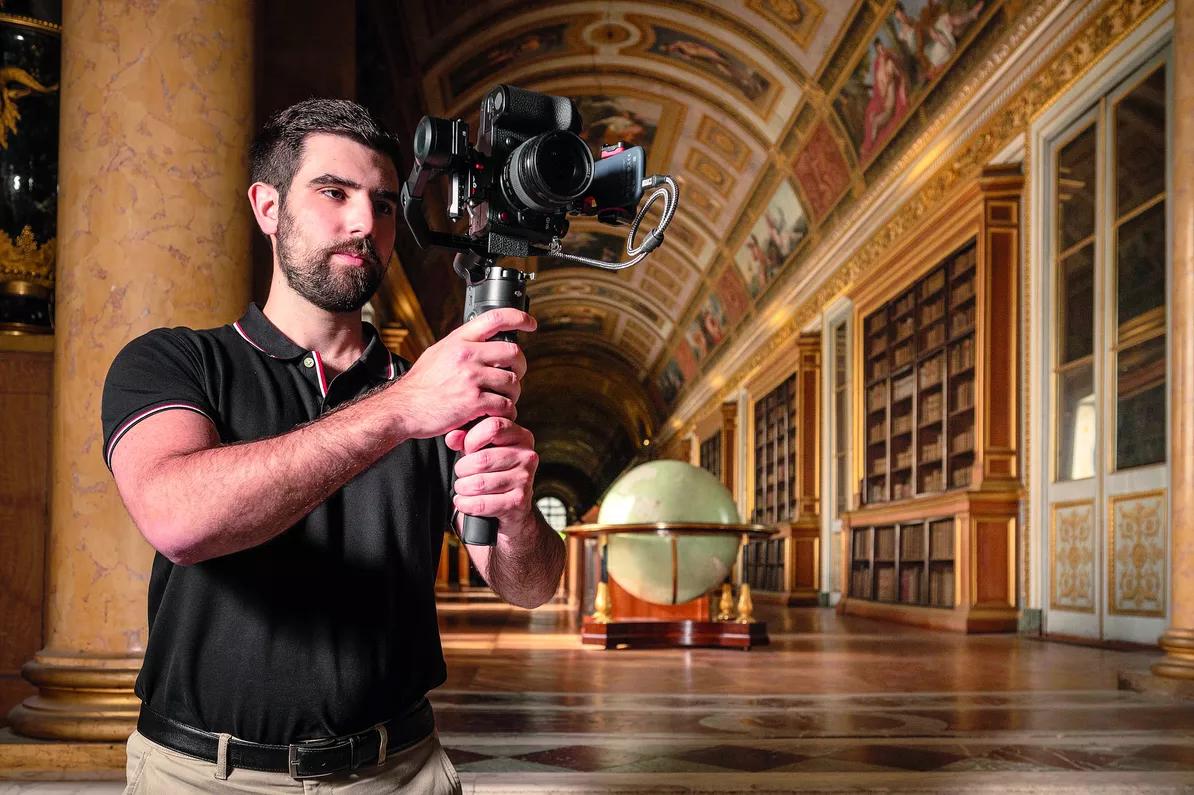
Simon Vasseur, La Garde du Patrimoine. "Heritage interests young people. There's a real demand for it. A lot of high school students who feel a bit lonely have written to me and are happy to see that a young person is interested in heritage, that it's becoming something cool." Olivier Coret for Figaro Mag
Avoid politicization
This small community of French heritage influencers knows and frequents each other. Back in 2020, when they were in their infancy, Simon, Pierre-Alexandre, Géraud and Antoine met at a dinner party. " Pierre-Antoine and Géraud brought the wine, and Géraud and Antoine cooked," says Simon. Today, they're a household name, with an increasing number of collaborations. Some have even gained tens of thousands of subscribers since we met them in March. " I don't think there's any glass ceiling," hopes Simon, who's aiming to reach the million mark.
It remains to be seen whether subscribers will become more diverse or, on the contrary, more homogenous. "One thing I'm worried about is the tendency to become radicalized, with this purist, authentic side taken to extremes. I've already been insulted because I don't know every piece of meat on a cow," says Yoann. " And the questions that keep coming up: what do you think, who do you vote for ? At a time when everything is political, the love of France, its landscapes, its gastronomy, its architecture and its art of living can be as much shunned by some as confiscated by others.
Read the article on www.lefigaro.fr
By Hugues Maillot and Mayeul Aldebert
for Le Figaro Magazine
Published May 17, 2024
